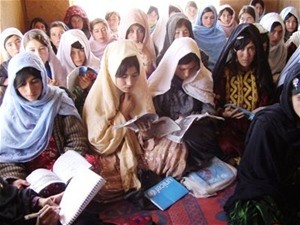
Women learn to read in a literacy class established by the community development council.
National Solidarity Programme
Community development council provides reading classes for villagers in Ghor Province.
13 JUNE 2010 | RABAT, GHOR PROVINCE, AFGHANISTAN
The establishment of a community development council (CDC) in the village of Rabat in Ghor Province has opened the door to educational opportunities for residents. After its formation with the support of the National Solidarity Programme (NSP), the CDC, an elected body of male and female community members, evaluated the needs of the community and created a literacy course with experienced male and female instructors.
The Government of the Islamic Republic of Afghanistan created the NSP to develop the ability of Afghan communities to identify, plan, manage, and monitor their own development projects. NSP empowers communities to make decisions and manage resources during all stages of the project cycle. The programme lays the foundation for a sustainable form of inclusive local governance, rural reconstruction, and poverty alleviation. The U.S. Government, through USAID, is proud to support this Afghan-led, multi-donor development effort.
The three-hour classes are popular with young and old villagers who are pleased to have the opportunity to learn to read. Female students attend the class in the morning and male participants study in the afternoon. CDC members regularly evaluate the class and continue to urge other community members to attend.
The course has been especially helpful for young women, who previously did not have access to education. Many graduates have passed the entrance exam to enter the fourth grade of local government-supported schools. The majority of students in the literacy course are committed to furthering their education and working for the development of their country.
Course participants offered strong praise for their local CDC and the opportunities they now have. "I was illiterate before I attended the literacy course in our village,” explained Mrs. Gulalai, a CDC member and literacy course participant. “Now, I can easily read books. Our course teacher has also taught us about hygiene and how to prevent the spread of diseases. Since I am now a learned woman, I can bring up my children nicely and well-educated."







Comment
Make a general inquiry or suggest an improvement.